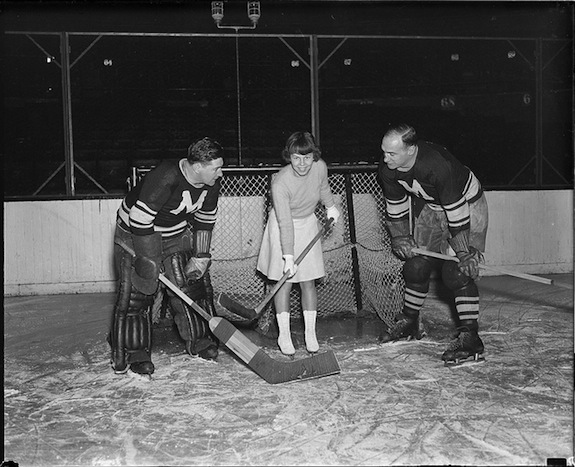The N.H.L. Officially Welcomes Gay Players With Most Inclusive Measures of Any Professional Sport
If you had to guess which sport had the most inclusive measures for LGBT people, you might be wrong. It’s the National Hockey League

Image: Boston Public Library
Sports aren’t exactly known for being inclusive to gay people. But on Thursday the N.H.L. announced a partnership with the You Can Play Project, a group aimed to up the acceptance of LGBT players and fans.
The National Hockey League says it’s always been committed to the LGBT community. Their press release, announcing the partnership, writes that the move “formalizes and advances their long-standing commitment to make the N.H.L. the most inclusive professional sports league in the world.” The players of the N.H.L. support the partnership, they say, and are ready to help the sports world move beyond discrimination against gay people.
In fact, the You Can Play project was founded in a large part because of a gay hockey player. The son of Brian Burke, one time general manager of both the Toronto Maple Leafs and the U.S. Olympic hockey team, came out in 2009. He was tragically killed in a car accident the next year, and his death spurred the formation of You Can Play to further Burke’s memory.
The N.H.L. isn’t the only place with a policy against discrimination against gay people. But policy and practice are often two different things. Robbie Rogers, former U.S. National Soccer team member and professional player in England, came out of the closet this year to much discussion. Many have wondered whether he will continue playing. It would make him the first openly gay athlete to play in a major American team sport. Many athletes have come out after their careers. Kwame Harris, an offensive tackle who played in the N.F.L. for six seasons didn’t come out until after he retired. The same goes for former running back David Kopay, one of the first American professional athletes to come out at all.
Players stay in the closet during their careers for a lot of reasons. Sports are still grappling with not just homophobic players, but coaches and owners as well. Last year, when a Ravens player spoke in favor of gay marriage, a Maryland politician sent a note to the team’s owner chastising him for allowing the player to speak up, promoting this now notorious response from Vikings punter Chris Kluwe. But even the N.F.L. is making moves that at least indicate willingness to try. Here’s the New York Times:
In the N.F.L., the league’s security department would monitor public reaction, looking for potential threats from fans in the event a player comes out. Troy Vincent, a former player who is now the league’s executive charged with player engagement, and Anna Isaacson, the league’s community relations director, have been designated to cull ideas from gay advocacy groups and to build relationships with the groups that the N.F.L. might then use to help them address players.
Wade Davis, a former N.F.L. player who’s now out of the closet is on You Can Play’s advisory board spoke recently about some of the challenges of gaining LGBT acceptance in the locker room, beyond the common homophobia the resides in the United States. Many athletes are quite religious and find it difficult to reconcile their beliefs with their potentially open teammate. Other players, however, just have one question. “Can someone help us win?” asked Robert K. Kraft of the New England Patriots. If they can, he told the New York Times, they should play. End of story.
For their part, the N.H.L. hopes to focus on that mentality, one that points out that gay players are not any different on the ice (or field) than straight ones. That has been You Can Play’s philosophy all along, that gay or straight, if you can play, you can play.
More from Smithsonian.com:
The United States Isn’t the Only Country Asking the Gay Marriage Question
Pediatricians Back Gay Marriage
/https://tf-cmsv2-smithsonianmag-media.s3.amazonaws.com/accounts/headshot/Rose-Eveleth-240.jpg)
/https://tf-cmsv2-smithsonianmag-media.s3.amazonaws.com/accounts/headshot/Rose-Eveleth-240.jpg)